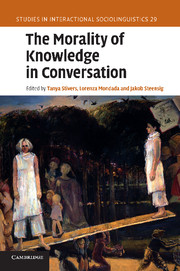Book contents
- Frontmatter
- Contents
- Contributors
- Preface
- Acknowledgements
- List of transcription and glossing symbols
- Part I Introduction
- Part II Affiliational consequences of managing epistemic asymmetries
- 2 The management of knowledge discrepancies and of epistemic changes in institutional interactions
- 3 Claiming epistemic primacy: yo-marked assessments in Japanese
- 4 Morality and question design: “of course” as contesting a presupposition of askability
- 5 Addressing epistemic incongruence in question–answer sequences through the use of epistemic adverbs
- 6 The epistemics of make-believe
- Part III Epistemic resources for managing affi liation and alignment
- Part IV Toward a framework
- References
- Index
3 - Claiming epistemic primacy: yo-marked assessments in Japanese
Published online by Cambridge University Press: 05 November 2011
- Frontmatter
- Contents
- Contributors
- Preface
- Acknowledgements
- List of transcription and glossing symbols
- Part I Introduction
- Part II Affiliational consequences of managing epistemic asymmetries
- 2 The management of knowledge discrepancies and of epistemic changes in institutional interactions
- 3 Claiming epistemic primacy: yo-marked assessments in Japanese
- 4 Morality and question design: “of course” as contesting a presupposition of askability
- 5 Addressing epistemic incongruence in question–answer sequences through the use of epistemic adverbs
- 6 The epistemics of make-believe
- Part III Epistemic resources for managing affi liation and alignment
- Part IV Toward a framework
- References
- Index
Summary
Introduction
In everyday conversation, when a speaker adopts an evaluative stance toward a referent that is accessible to his/her recipient (a first assessment), this invites the recipient to convey his/her evaluative stance about the same referent in the next turn (a second assessment). Second assessments can be formulated as agreements or disagreements in multiple ways, and their design manifests a systematic preference for agreements over disagreements in interaction (Pomerantz 1984a). For instance, Pomerantz (1984a) observes that for English conversation a speaker who is agreeing with a prior assessment often proffers an upgraded evaluation (e.g., “It's just gorgeous,” to agree with “It's a beautiful day”) while a disagreement tends to be prefaced with a same-degree, or formulated via a downgraded, evaluation. This bias toward agreement can be seen as a way in which speakers orient to the maintenance and maximization of social solidarity in interaction (Heritage 1984b: 265).
However, agreement or disagreement on evaluative stances is not the only issue that matters when interactants assess a referent in conversation. Interactants also display their concern with their and their interlocutor's epistemic stances vis-à-vis the referent (Goodwin and Goodwin 1987; Hayano 2007a, b; Heritage 2002a; Heritage and Raymond 2005; Kanai 2004; Morita 2005; Raymond and Heritage 2006; Schegloff 1996a; Sorjonen 2001). When speakers produce a first assessment, they adopt not only an evaluative stance but also an epistemic stance. Employing linguistic resources, they embody how they see information or knowledge to be distributed between them and the recipients.
Information
- Type
- Chapter
- Information
- The Morality of Knowledge in Conversation , pp. 58 - 81Publisher: Cambridge University PressPrint publication year: 2011
Accessibility standard: Unknown
Why this information is here
This section outlines the accessibility features of this content - including support for screen readers, full keyboard navigation and high-contrast display options. This may not be relevant for you.Accessibility Information
- 67
- Cited by
